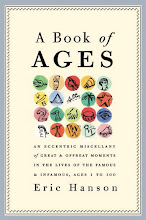I associate Memorial Day with the small town parade of my childhood. Old men in carefully preserved uniforms. Small flags at the cemetery. It wasn't until I'd grown older that I realized what was on the minds of those old men in uniform. They'd grown old while comrades of theirs had not. What would those other lives have been like if events had turned out differently? Roles reversed. It's the kind of speculation the other bystanders are incapable of. They say crisis pulls all of history into a single moment. I wrote my book as a collection of moments, funny, sad, tragic, heroic and commonplace. Many of them take place in wartime, with lives suddenly put in the balance.
It's hard to visualize J. D. Salinger wading ashore on D-Day or caught up in the Battle of the Bulge, but he was there; the most searing episodes of his fiction were shaped there. Unlike Norman Mailer, Joseph Heller, James Michener or Kurt Vonnegut, Salinger didn't write war stories; the war unfolds for his characters when they have arrived back home. Heller invented a term for the everyday insanity of military protocol: He called it Catch 22. He flew 60 missions as a bomberdier. War takes on a strange abstraction from thousands of feet in the air.
Like Salinger, Vonnegut was on the ground at the Battle of the Bulge. He was captured and shipped to Dresden where he experienced the firebombing of that city, an experience that reappears in his novel Slaughterhouse Five. Norman Mailer and James Michener experienced the war in the Pacific. The soldiers who came home alive read those novels in the backyards of their suburban homes.
One of the greatest war novels every written describes a Civil War that ended six years before the author was born. Stephen Crane wrote the Red Badge of Courage in 1895 when he was 24. 24 year-old J. R. R. Tolkien spent four months of 1916 in the trenches at the Battle of the Somme. Hospitalized, recovering from wounds, he passed the time writing stories about goblins and elves. Ernest Hemingway was an 18 year-old ambulance driver on the Italian Front in 1918, when he received 200 bits of shrapnel rescuing a soldier under fire. A Farewell to Arms would be written a decade later. The intervening period was written in the voice of Nick Adams who says very little about his war experiences. How do you describe such scenes without diminishing them?
War is heroism and foolishness, vast organization characterized by mass inefficiency, enormous effort in an important cause and an enormous waste of time and money, it is the seizing and avoidance of responsibility. When we visualize World War II we often imagine a soldier who looks like John Wayne because he spent so much time in uniform in movies; but he never served. James Stewart was a contemporary of Wayne's when he was flying bomber missions over Europe, age 35, but afterward avoided roles playing soldiers. He'd done that, lived it.
Harry Truman was 34 years-old when he commanded Battery D in the 129th Field Artillery. We have a picture of a man in steel-rimmed glasses and a panama hat; it's hard to imagine him in uniform. At age 60 he had the lives of millions of American soldiers and sailors on his mind when he decided to drop the A-bombs on Japan. There are no easy decisions in wartime. On the evening of June 5, 1944 Dwight Eisenhower went to bed knowing the failure or success of the next day's invasion of France, and the future of the free world, would probably be decided by the weather over the English Channel. Even so, he had a letter in his pocket taking full responsibility for whatever might unfold.
Monday, May 25, 2009
Memorial Day
Subscribe to:
Post Comments (Atom)





No comments:
Post a Comment